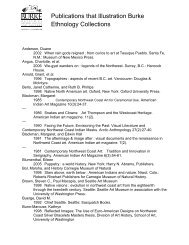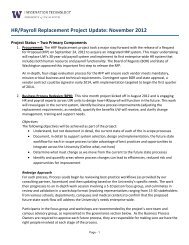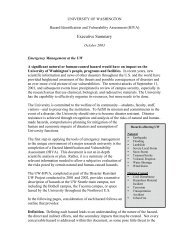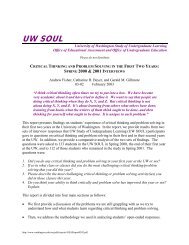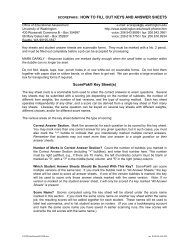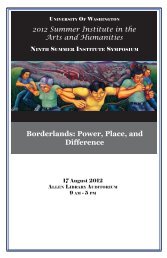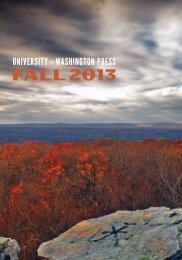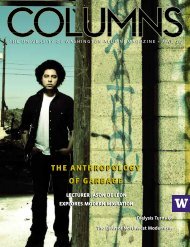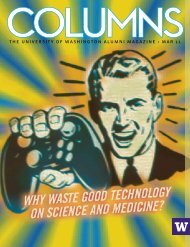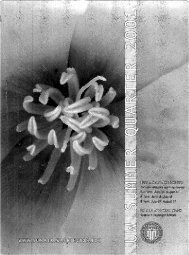PDF version - University of Washington
PDF version - University of Washington
PDF version - University of Washington
You also want an ePaper? Increase the reach of your titles
YUMPU automatically turns print PDFs into web optimized ePapers that Google loves.
Letters let us have it<br />
left. We marveled at his 20,000-book collection<br />
from floor to ceiling, under windows<br />
and even under the library table. That<br />
was the collection Dr. Benham gave the<br />
<strong>University</strong> on the Centennial Anniversary<br />
<strong>of</strong> the “U,” I think. The collection is in the<br />
rare books collection in Suzzallo Library.<br />
My later memories include the late<br />
1960s during student demonstrations<br />
when the students were sometimes locked<br />
out or locked into classes. The most bizarre<br />
demonstration was walking into<br />
the Art Building to see a student walking<br />
down the hall in nothing but her boots.<br />
I never discovered what she was demonstrating<br />
for—or against.<br />
Nancy Boothroyd Rummel, ’53, ’73<br />
everett<br />
ATHLETICS COMMUNICATIONS<br />
The March issue <strong>of</strong> Columns paid tribute to the Husky men’s crew that stunned the world by winning<br />
the gold medal at the 1936 Olympics in Berlin. We showed the crew, and the race they won—<br />
but we didn’t identify them by name. Here, a fitting tribute to the men who made that happen.<br />
THE 1936 VARSITY, left to right: Don Hume, stroke; Joe Rantz, 7 seat; George “Shorty” Hunt, 6 seat;<br />
Jim McMillan, 5 seat; John White, 4 seat; Gordy Adams, 3 seat; Charles Day, 2 seat; Roger Morris,<br />
bow seat. Kneeling is coxswain Bob Moch, the only senior.<br />
The Community <strong>of</strong> Crew<br />
) The Class <strong>of</strong> ’62 rowing team celebrated<br />
its 50th reunion by attending the Varsity<br />
Boat Club Banquet on Friday, March<br />
23. Not only that, but we awoke the next<br />
morning and bravely took a Pocock shell<br />
out for a row.<br />
As we rowed through the Montlake Cut,<br />
as we did thousands <strong>of</strong> times during our<br />
rowing years at the UW, we were treated<br />
to an amazing sight. The Grunties, as the<br />
freshman oarsmen are called, had painted<br />
our motto on the wall <strong>of</strong> the cut—’62 The<br />
Winning Crew.<br />
We have adopted the Husky freshman<br />
rowing team and are supporting them<br />
with new gold workout shirts with our<br />
motto proudly displayed on the back.<br />
Coach Luke McGee reports that the<br />
Grunties are “stoked” and so are we few<br />
remaining ’62 oarsmen.<br />
There were only a handful <strong>of</strong> us available<br />
for the row but other class <strong>of</strong> 1962<br />
oarsmen supported our efforts. That effort<br />
included a brand new set <strong>of</strong> carbon<br />
fiber Concept-2 oars for the varsity—inscribed<br />
with the motto, ’62 The Winning<br />
Crew. In the words <strong>of</strong> some <strong>of</strong> the varsity<br />
oarsmen, “Su-weet!”<br />
John W. “Maggie” Magnuson<br />
B.A., Political Science, ’63<br />
lakewood<br />
Campus Memories<br />
) As a granddaughter <strong>of</strong> Dr. Allen R.<br />
Benham and graduate <strong>of</strong> the UW, my<br />
memories go back at least 75 years. My<br />
mother, Caroline, also attended the <strong>University</strong><br />
and <strong>of</strong>ten took me and my sister to<br />
the campus. The “must see” was always<br />
the mummy in the old museum near<br />
Frosh Pond. Mother also shared memories<br />
<strong>of</strong> the AYP Exposition, which she remembered<br />
visiting as a 3-year-old.<br />
Of course, we visited grandpa in Parrington<br />
Hall, first floor, last room on the<br />
Stop Crying Wolf<br />
) I am appalled that Columns (March<br />
2012) printed the embarrassing anti-conservation<br />
rant <strong>of</strong> Carl Baldwin. Besides<br />
besmirching a noted alumnus, Rodger<br />
Schlickeisen, ’63, and Defenders <strong>of</strong> Wildlife,<br />
he provides no evidence that wolves,<br />
bears or any other wildlife have “taken<br />
over and forced us in production agriculture<br />
to give up on feeding America.”<br />
Nothing could be further from the truth.<br />
Production agriculture is market-driven;<br />
the ability to compete with each other and<br />
with products from other countries determines<br />
which farmers and ranchers survive<br />
and which do not. Although 62 percent <strong>of</strong><br />
farmers and ranchers do not get subsidies,<br />
from 1995-2010 those farmers and ranchers<br />
that do receive subsidies took in $261.9<br />
billion. About two-thirds <strong>of</strong> that was commodity<br />
(base-price) guarantees and about<br />
10 percent each went to crop insurance,<br />
disaster and conservation subsidies.<br />
In good years, farmers and ranchers make<br />
money, and in bad years taxpayers provide<br />
support. Stockmen pay vastly less than<br />
market value, as much as 10 times less in<br />
many Western states, for the privilege<br />
<strong>of</strong> grazing cattle and sheep on public<br />
land. They get water development and<br />
fencing paid for; and when, very rarely,<br />
they have predator problems, they are paid<br />
market value for animals killed by wolves.<br />
It’s a form <strong>of</strong> rural welfare. And yet, unhappy<br />
with the lives they’ve chosen, they<br />
cry “wolf” when endangered species begin<br />
8 UW 150 Years



